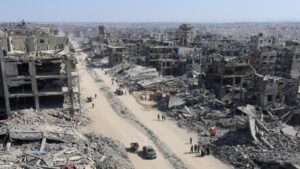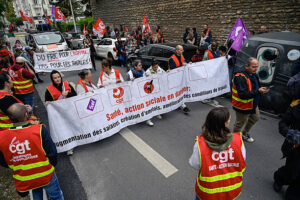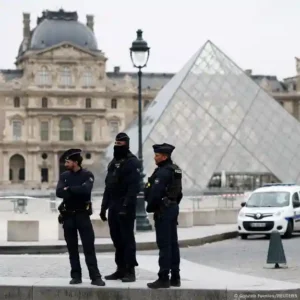For years, the people living there have asked for more state security in the area while also attempting to defend themselves.
Mario, Pedro, Ángel, Pedro, David, Francisco, Luis, and Uriel were the names of the deceased. Their origins were in Nahuatl. According to the local press, a priest celebrated mass in the Nuestra Señora de la Asunción church in their honor, and their bodies were interred in the town. Additionally, it states that Commander Teto personally begged for forgiveness from their families. As they were patrolling the forests surrounding Coahuayana, between the towns named Sal Si Puedes (leave if you can) and La Presa (prisoner or prey), the CJNG ambushed them. According to the Efe news agency, the CJNG used a monster truck in the attack, a large armored vehicle that resembles homemade tanks and is made of layers of steel. On Sunday, all eight were buried.
The area is under siege by the CJNG and other armed groups. It is dotted with beaches that lead to the Pacific Ocean, which the state Attorney General’s Office claims are perfect for trafficking drugs from South America. They use anti-personnel mines, bullets, drones that can be bought online and modified to launch homemade explosives, threats, kidnappings, and disappearances to maintain an encirclement.
For years, the people living in Coahuayana and the neighboring municipalities of Aquila and Ostula, which are located between the borders of Michoacán and Colima, have been pleading for assistance in the form of increased police presence, better security, arrests, and other measures to discourage drug trafficking. They are currently losing the fight. Self-defense organizations such as Teto’s have been springing up everywhere in the area for decades. One is replaced by another when one is destroyed. The people’s desperate attempt to bridge the gaps left by the government is to try to fill them with used hunting rifles or used machine guns purchased on the black market.
In Coahuayana, day laborers and workers who package and cut bananas.
In a May interview with this newspaper, Commander Teto acknowledged that he was worn out. “Although I am worn out, I am more angry with the administration. The government still has mistrust for us! While we do not oppose them, we do object to their support of the CJNG. There are Mexican army and National Guard bases close to Coahuayana, but other than the occasional skirmish, the CJNG are free to roam around. Even the military has been targeted on occasion. In February, for example, a drone ambush in Tepalcatepec, a few hours’ drive from Coahuayana, claimed the lives of three soldiers. The area is disputed between the CJNG and a local group called El Abuelo, who are associated with the Knights Templar.
In and around Coahuayana, the delicate balance is walked carefully, with the unarmed civilians, banana-growing peasants, mining workers, and auto parts vendors always coming off worst. In that interview, Teto admitted that the farmers are compelled to pay the cartel a revolutionary tax of one peso for every kilogram of plantains—which they then sell for six pesos—so that the trucks carrying the fruit can drive through the territory controlled by the criminals without any problems.
As is customary in the wake of incidents such as last Saturday, the authorities have committed to stepping up military patrols and bolstering security, but these steps are currently insufficient for the community. Not only is Coahuayana a target for crime, but in recent years, displaced people from nearby towns—smaller, more remote communities where cartel control is stronger—have come to seek safety in the hope that self-defense forces will defend them. Although the president of the local banana producers’ association claimed that since they have been patrolling the area, there have been no security issues on the plantations, Commander Teto and his men make an effort, but it is nearly impossible to stay vigilant all the time.





